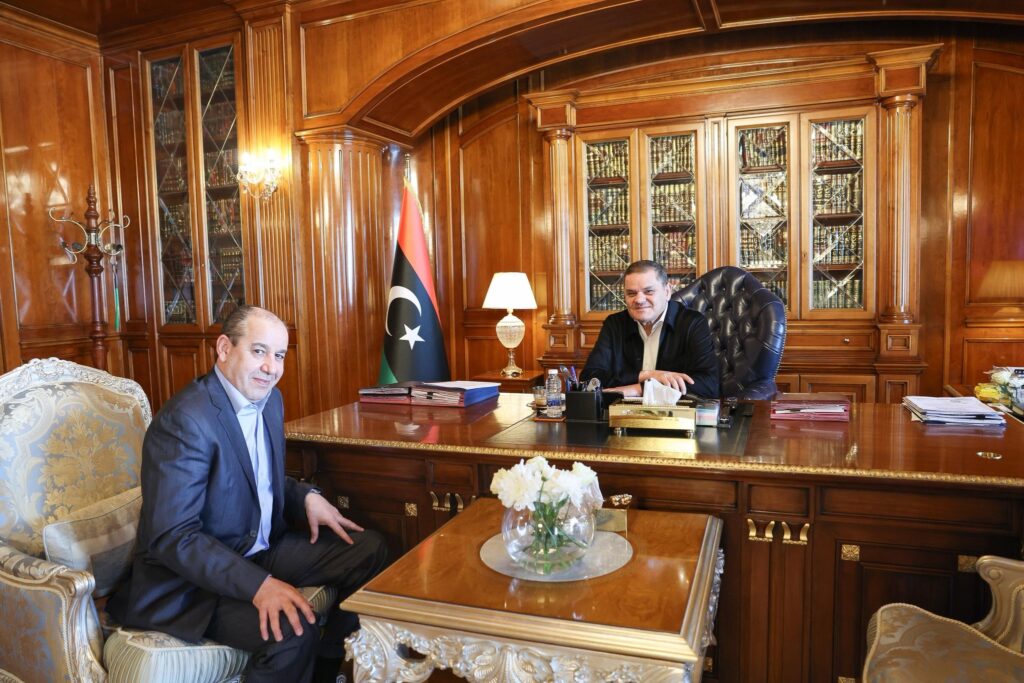Tripoli— Following an intense night of armed clashes in Tripoli that started on Monday afternoon, the head of the Government of National Unity (GNU) swiftly moved to dismantle some of the armed groups that have strangled the capital and the western region since 2011. But he faces criticism as the situation remains tense as of early Wednesday morning.
PM Abdulhamid Dbeibeh issued decisions on Tuesday whereby dissolving the Combating Illegal Immigration Agency, the Special Operations Force and the Judicial Security and Operations Department, affiliated with the Judicial Police Apparatus. He transferred all their powers and resources to the Ministry of Interior.
In addition to transferring the Judicial Security and Operations Department, he ordered the establishment of a committee to monitor prisons and detention centers to be headed by Minister of Interior.
However, these decisions have already been criticized as being based on the PM Dbeibeh’s “selectivity.” The residents of the Tripoli suburb of Souq Al-Juma’a issued a statement warning that only those in the capital were targeted, while others in cities like Misrata, the PM’s hometown, were ignored.
Also on Tuesday, Mr. Dbeibeh appointed Brigadier General Mustafa Ali al-Wahishi as head of the Internal Security Service, succeeding Major General Lutfi al-Harari, who was a close ally to the dead of the Stability Support Apparatus (SSA) who was killed yesterday.
The media office of the GNU said in a statement that Al-Wahishi’s appointment is “part of a series of measures to enforce the state’s authority and extend the rule of law.”
Commenting on the events that took place on Monday and the subsequent clashes, Dbeibeh said they were “a decisive step towards ending irregular groups.” He paid tribute to the Ministries of Interior and Defense, and all members of the army and police, “for their significant accomplishments in establishing security and imposing state authority in the capital,” according to a post on his official Twitter account.
He added that what was achieved “confirms that the state institutions are capable of protecting the nation and preserving the dignity of citizens. It constitutes a decisive step towards ending irregular groups and establishing the principle that there is no place in Libya except for state institutions and no authority except for the law.”
Al-Wahishi, who has been until now the Director of the Central Security Department of the Intelligence Service, was himself kidnapped in Tripoli on 6 November 2024 as he was heading home from work. He was released on 13 November.
Al-Wahishi is professional security personnel who had graduated from the College of Police in Libya in the 1990s. His kidnapping incident last year nearly sparked armed clashes in Tripoli between forces from the city of Zintan, which had sent massive military reinforcements and were prepared to fight for his release, and the capital’s militias.
Meanwhile, the Ministry of Interior said the situation in Tripoli is “safe and stable,” as security personnel are “carrying out their duties.” It called on employees to report to work and contribute to the return of normal life.
Nonetheless, the Suoq Al-Juma’a residents said their statement that they “will not accept any selective or politicized decision directed against security groups in Tripoli alone, under the pretext of organizing weapons or violating legitimacy.” They emphasized that armed groups in other cities, particularly Misrata, continue to operate outside the official framework without being subjected to any similar measures.
The statement considered this policy to “perpetuate division, fuel strife, and expose the capital to the risk of security chaos and insecurity,” calling for the issuance of “a clear decision issued by the highest legitimate authority, to be applied to all armed groups in all Libyan cities without exception.”
The residents affirmed their support for the state, its institutions, and the rule of law, but emphasized that they “will not stand idly by in the face of any attempt to target them or disrupt the balance of national power under the guise of organizing weapons.”
The statement concluded by recalling that the Souq al-Juma’a community has been at the forefront of defending the capital and the legitimacy of the state, and will not accept being made a “scapegoat” in political conflicts.
The British Foreign, Commonwealth & Development Office (FCDO) has advised British citizens on 13 May against all travel to Libya except to the cities of Benghazi and Misrata. It advised against travel the capital Tripoli citing heightened military presence in the city. The FCDO said the “potential for further violence cannot be ruled out.”
Early Tuesday, the Director General of Mitiga International Airport in Tripoli, Ibrahim Farkash, said the airport was operating normally, denying any official instructions otherwise, as cited by Al-Wasat newspaper.
